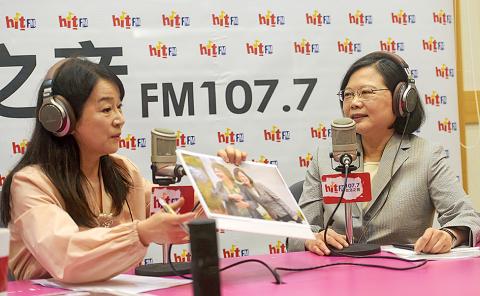President Tsai Ing-wen (蔡英文) yesterday called for a rebuilding of basic mutual trust with China, and reiterated that she would like to meet Chinese President Xi Jinping (習近平), as long as such a meeting is based on reciprocity, with no political conditions.
“The two sides should rebuild basic mutual trust and sit down and talk given the overall international situation,” Tsai told political commentator Clara Chou (周玉蔻) during an interview on Hit FM radio. “Now that South and North Koreas have done so, I think Taiwan and mainland China should also engage in detailed communication.”
“Although there have been cross-strait exchanges in the private sector, I think there is a need for the two sides to advance and deepen two-way communication,” she said.

Photo: Chang Chia-ming, Taipei Times
Asked in the radio interview why she is unwilling to back the so-called “1992 consensus” while acknowledging that a cross-strait meeting took place in 1992, Tsai said: “We must explore the truth based on facts.”
“It is a fact that Taiwan and mainland China held a meeting that year, the results of which were interpreted differently by the two sides,” she said. “Maybe the ‘1992 consensus’ contains other explanations, but the question is whether the people of Taiwan can accept them or whether China can accept the KMT’s interpretation.”
“To me, it is an issue that could jeopardize our sovereignty and I will not compromise,” she said.
While Beijing sees the supposed consensus as the political foundation for cross-strait exchanges, the Democratic Progressive Party has refused to endorse it.
Representatives of the Straits Exchange Foundation and China’s Association for Relations Across the Taiwan Strait met in Hong Kong from Oct. 28 to Oct. 30, 1992. No statements were made by either side after the meeting, although each side did issue statements about the talks over the following two months.
Former Mainland Affairs Council chairman Su Chi (蘇起) said in 2006 that he had made up the term “1992 consensus” in 2000 to refer to a supposed tacit understanding between the Chinese Nationalist Party (KMT) and the Chinese government that both sides acknowledge there is “one China,” with each side having its own interpretation of what “China” means.
Asked if Premier William Lai’s (賴清德) description of himself as a “pragmatic worker for Taiwan independence” had prompted the Chinese People’s Liberation Army Air Force to send aircraft on missions circling Taiwan in recent months, Tsai told Chou that Lai is an “honest man.”
“The mainland should know that Taiwan is a democratic society, and it should understand that different opinions can be aired freely in an open society before a consensus could be forged,” she said.
Asked about her falling approval ratings, Tsai said opinion polls did not bother her, because “what counts is whether you have done your best to achieve your goal.”
A poll released yesterday by the Chinese-language United Daily News found that 56 percent of respondents disapproved of Tsai’s performance, up from 50 percent a year ago, while 29 percent approved, down from 30 percent a year ago.
On specific issues, 56 percent of respondents said they were not satisfied with her performance on cross-strait relations and 62 percent were unhappy with her performance on the economy.

Chinese Nationalist Party (KMT) Chairman Eric Chu (朱立倫), spokeswoman Yang Chih-yu (楊智伃) and Legislator Hsieh Lung-chieh (謝龍介) would be summoned by police for questioning for leading an illegal assembly on Thursday evening last week, Minister of the Interior Liu Shyh-fang (劉世芳) said today. The three KMT officials led an assembly outside the Taipei City Prosecutors’ Office, a restricted area where public assembly is not allowed, protesting the questioning of several KMT staff and searches of KMT headquarters and offices in a recall petition forgery case. Chu, Yang and Hsieh are all suspected of contravening the Assembly and Parade Act (集會遊行法) by holding

PRAISE: Japanese visitor Takashi Kubota said the Taiwanese temple architecture images showcased in the AI Art Gallery were the most impressive displays he saw Taiwan does not have an official pavilion at the World Expo in Osaka, Japan, because of its diplomatic predicament, but the government-backed Tech World pavilion is drawing interest with its unique recreations of works by Taiwanese artists. The pavilion features an artificial intelligence (AI)-based art gallery showcasing works of famous Taiwanese artists from the Japanese colonial period using innovative technologies. Among its main simulated displays are Eastern gouache paintings by Chen Chin (陳進), Lin Yu-shan (林玉山) and Kuo Hsueh-hu (郭雪湖), who were the three young Taiwanese painters selected for the East Asian Painting exhibition in 1927. Gouache is a water-based

Taiwan would welcome the return of Honduras as a diplomatic ally if its next president decides to make such a move, Minister of Foreign Affairs Lin Chia-lung (林佳龍) said yesterday. “Of course, we would welcome Honduras if they want to restore diplomatic ties with Taiwan after their elections,” Lin said at a meeting of the legislature’s Foreign Affairs and National Defense Committee, when asked to comment on statements made by two of the three Honduran presidential candidates during the presidential campaign in the Central American country. Taiwan is paying close attention to the region as a whole in the wake of a

OFF-TARGET: More than 30,000 participants were expected to take part in the Games next month, but only 6,550 foreign and 19,400 Taiwanese athletes have registered Taipei city councilors yesterday blasted the organizers of next month’s World Masters Games over sudden timetable and venue changes, which they said have caused thousands of participants to back out of the international sporting event, among other organizational issues. They also cited visa delays and political interference by China as reasons many foreign athletes are requesting refunds for the event, to be held from May 17 to 30. Jointly organized by the Taipei and New Taipei City governments, the games have been rocked by numerous controversies since preparations began in 2020. Taipei City Councilor Lin Yen-feng (林延鳳) said yesterday that new measures by